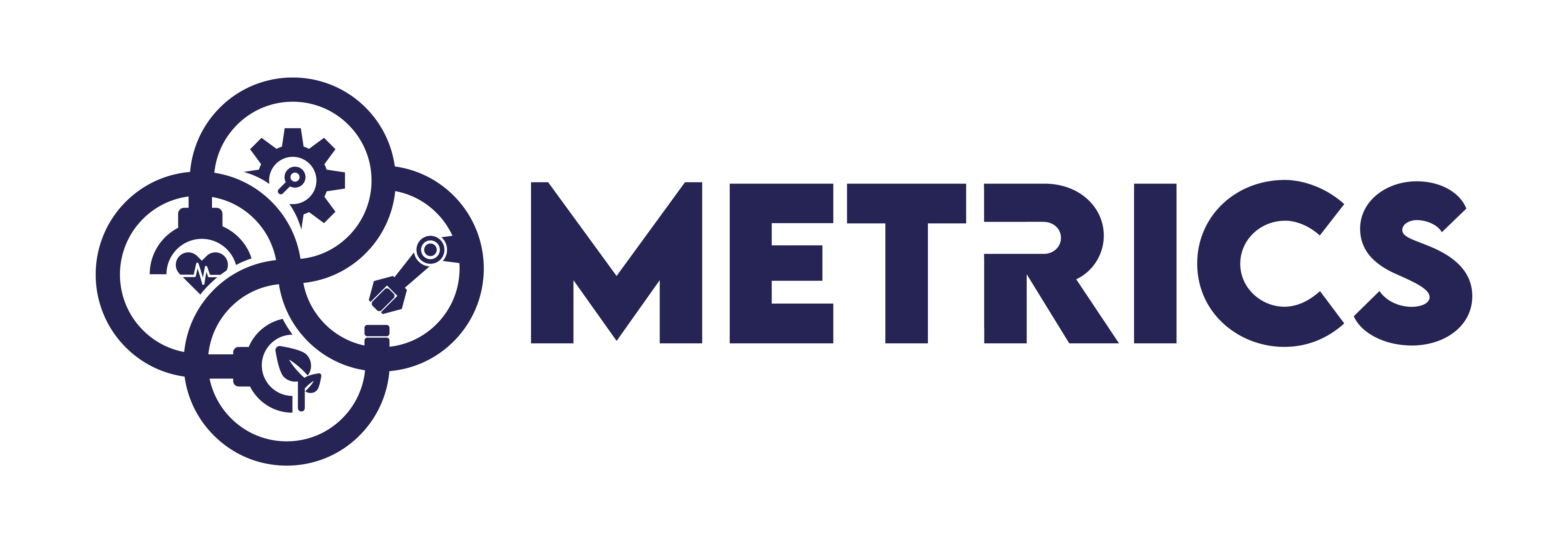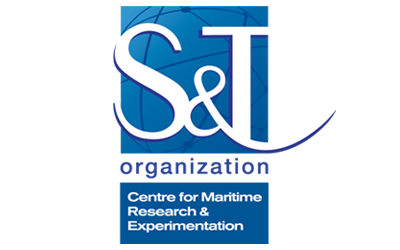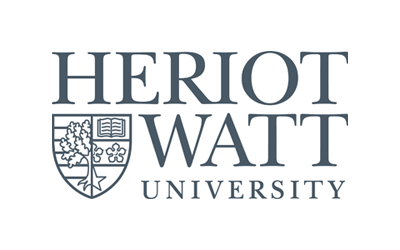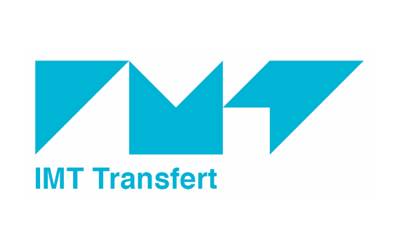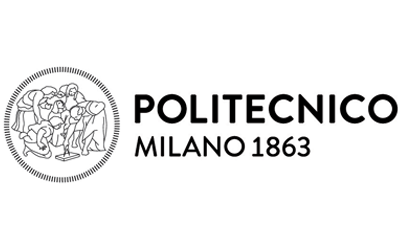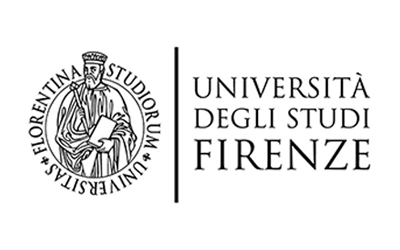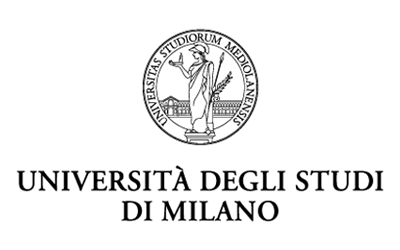METRICS CONSORTIUM
METRICS brings together 17 partners, all expert in robotics competition and metrology, with highly complementary testing facilities and networks in the four priority areas. This experienced consortium ensures that METRICS benefits from the feedback of past and current competitions and projects and is highly complementary with European initiatives and networks.
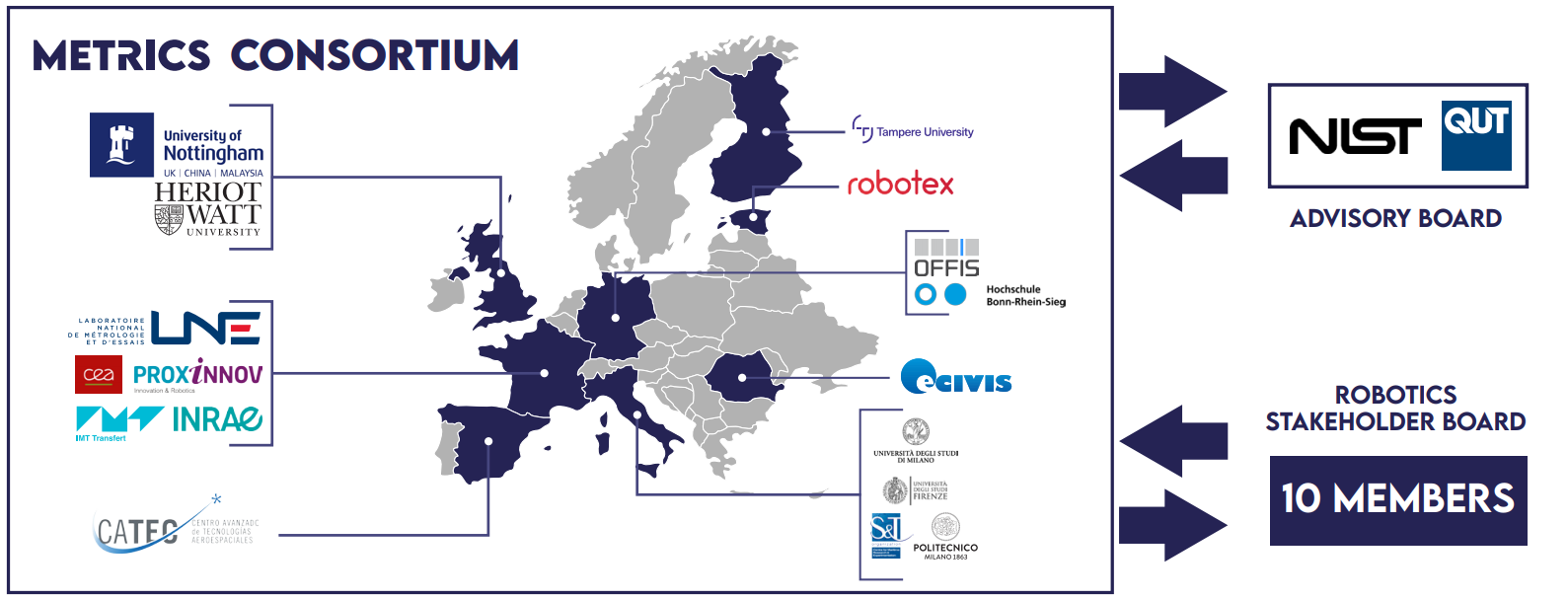
CONSORTIUM PARTNERS
LNE
LNE, the leading national metrology laboratory for industry, works to support companies in their quest for innovation and anticipate new measurement and testing requirements linked to technological developments and society’s new expectations in the fields of health, safety, quality and environmental protection.
Since 2008, LNE, as a trusted third party, has been performing evaluations in the field of artificial intelligence and robotics.
LNE is the coordinator of METRICS project and is providing the project with its skills in organising evaluation campaigns, defining test scenarios and designing test environments and verified, annotated test databases, together with its expertise in metrology applied to AI to measure the performance of the intelligent systems evaluated in a rigorous, repeatable manner using metrics and uncertainty analysis.
BRSU
BRSU is a relatively young university founded in 1995 in the Bonn/Cologne area. The Faculty of Computer Science offers 2 undergraduate and 3 graduate programs including the international Master's program on Autonomous Systems. The program has a strong focus on robotics, distributed systems design and engineering (including topics such as system architecture, middleware, integration frameworks), learning and reasoning (robot learning, probabilistic reasoning), and multirobot teams. The program features student-run teams in the @home and @work competitions in RoboCup, who also participated in most RoCKIn, RockEU2 and SciRoc competition events.
CATEC
CATEC, the Advanced Center for Aerospace Technologies, is a research center established in 2008 and managed by the non-profit organization Andalusian Foundation for Aerospace Development (FADA). Its main goal is R&D on aerospace-related technologies in coordination with industry, universities and other research centers; promoting and developing technical knowledge and transferring it to the industry through applied research. CATEC currently has 45 researchers, 20 of which are working specifically on aerial robotic technologies, and has a large experience developing solutions and applications using aerial robots through several European projects (9 FP7 and 8 H2020 in the past 10 years).
CMRE
With over 60 years of accumulated knowledge and experience in undersea research, CMRE is a recognized centre of world-class expertise in the maritime domain. The Centre is a collaboration hub for scientists from all NATO Nations to work together to maintain NATO’s maritime technological edge. Today, the Centre’s scope encompasses the fields of deep-learning, big data, artificial intelligence, underwater acoustics, oceanography and autonomous systems. CMRE provides an outstanding at-sea research environment where internationally recognized scientists and engineers from NATO Nations share their knowledge while delivering results more effectively than would be possible by individual nations.
CEA
CEA is a R&D governmental agency whose field of expertise applies to energy, health, transport, security, defence, and ICT. Since its creation in 1945, it has successfully responded to major societal and scientific challenges, like the French nuclear power generation program, nuclear deterrence, micro and nanotechnologies, astrophysics, medical imaging, toxicology and biotechnologies. CEA has more than 15000 researchers working throughout France. CEA is identified by Reuters as the second most innovative research institution in the World in 2017. CEA Tech is the technological research division of CEA. The mission of CEA Tech is to improve industrial competitiveness through technological innovation.
E-CIVIS
E-Civis is an NGO founded in 2009 to use new technologies in the human rights field. In the later years, the organization is focused on the impact that all the new technologies will have on society and different types of citizens. While promoting digital education, as a member of the Digital Skills and Jobs Coalition and promoting robotics through classes, European Robotics Week and RoboHub, E-Civis is working closely on advocating for fair and protecting rules regarding the impact of these new developments. The organization believes that technological development is just a tool, it depends on humans how they will use it.
HWU
Founded in 1821 as the world’s first mechanics institute, Heriot-Watt has a rich heritage and is valued for its pioneering research informed by the global needs of business and industry. At the Edinburgh Centre of Robotics, we work on various research areas in the field of Robotics and Autonomous systems, with a focus on safety and safe interaction between robots, people and their environments. Through the Ocean Systems Laboratory and the Robotic Assisted Living Testbed, we bring over 35 years of experience in underwater signal processing and autonomous systems, and a user-centered living lab, integrating concurrent research and innovation processes within a public-private-people partnership.
IMT
Teralab is an artificial intelligence and big data platform that provides access for organizations to remove technological barriers to the use of their own data. TeraLab offers technical, legal and infrastructure tools and resources in a sovereign, secure and neutral environment allowing organizations to experiment and accelerate technology transfer. TeraLab is part of IMT (Institut Mines-Télécom), a French national institute for science and technology that federates leading engineering and management schools across France.
INRAE
On 1 January 2020, the National Institute of Agricultural Research (INRA) and the National Research Institute in Science and Technology for Agriculture and Environment (IRSTEA) merged to become a single research institute, the National Research Institute for Agriculture, Food and the Environment (INRAE). Thanks to the complementary disciplines and technological and scientific skills present in the both scientific structures, INRAE’s goal is to become one of the world's leading research to take into account the societal issues: Food and nutrition security; Transition of agriculture (agro-ecology, decrease of chemistry); Management of natural resources and ecosystems (water, soil, forest); Erosion of biodiversity; Circular economy and natural hazards
OFFIS
The OFFIS Institute for Information Technology, founded in 1991, is an application-oriented non-profit research and development institute related to the Computer Science department of the University of Oldenburg in Lower Saxony, north-western Germany. With a total staff of about 300 people, OFFIS investigate the domains manufacturing, healthcare, energy, and transportation. OFFIS houses multiple living labs, including one for manufacturing and industry 4.0 as well as multiple labs in the healthcare domain. The main research areas in robotics at OFFIS are human-robot collaboration, perception as well as mixed reality interfaces.
POLIMI
Politecnico di Milano has been established in 1863 and is one of the largest Italian universities, with five campuses, 9 Schools and over 40.000 students. It participates to the METRICS project with its Artificial Intelligence and Robotics Laboratory (AIRLab).
AIRLab is one of the leading Italian research groups in AI and Robotics. Its researchers have key expertise in robotics benchmarking, robotics competitions and good experimental methodologies in robotics. AIRLab has a strong record of participation and coordination in H2020 projects: among these, projects RockEU2, SciRoc, METRICS, RobMoSys and EUROBENCH (the last two via subprojects) are notable for their focus on benchmarking.
PRX
PRX is a platform dedicated to the industrial field of robotics. It was officially launched in October 2013 and is based on a technical workshop, fitted out with several robots, components and dedicated softwares. This goes along with technical knowledge and skills. PRX provides a global support to robotics projects of companies, going from the analysis to the technical development, industrialization and launching, not to forget the training to change management.
RTX
Robotex is Estonian based organization whose aim is to organize Robotex International – an annual robotics festival that brings together thousands of engineers, executives, students and families to be inspired by technology industry leaders, examine new start-ups, build robots for various challenges and learn about the latest technology innovations. By 2020 Robotex has pre-competitions in 9 different countries from all over the world (Finland, Greece, China, India, Colombia, Cyprus, Armenia, Turkey and South Korea).
UNIFI
The University of Florence (UNIFI), established in 1321, is one of the largest organizations for research and higher education in Italy and today it comprises twelve schools with over 1900 tenured teaching staff and researchers and about 60,000 students enrolled. UNIFI is involved through the Department of Industrial Engineering (DIEF), embracing competencies and experiences in the areas of Industrial Robotics, Mechatronics, Assistive BioRobotics, Internet of Robotics Things, Marine Robotics, Exoskeletons for Rehabilitative and Assistive purposes, Computational Vision, Additive manufacturing, Autonomous Vehicles.
TAU
Tampere University was created in January 2019 by the merger of the Tampere University of Technology and the University of Tampere, which joined forces to create a new foundation-based university. At TAU, research groups and projects conduct multidisciplinary research across institutional boundaries. TAU is situated on several campuses and is a community of 30,000 undergraduate and postgraduate students and 5,000 employees. The distinctive strength of TAU is in the interaction between basic and applied research. The University is a sought-after partner for collaborative research and development projects with business and industry and a fertile breeding ground for innovation and new research- and knowledge-based companies.
UNIMI
The University of Milan, also known as ‘La Statale’, is one of Italy’s younger university institutions. It was founded in 1924 thanks to the tenacious efforts of doctor and gynaecologist Luigi Mangiagalli, who in creating La Statale. Now this istitution included the Academy of Letters and Science; the Palatine Schools which numbered intellectuals and scholars such as Paolo Frisi, Cesare Beccaria and Giuseppe Parini among its teachers; the Schools of Advanced Studies in Veterinary Medicine and Agriculture; the Brera Astronomical Observatory and another Clinical Specialisation Institutes established in 1906, for the training of young doctors.
UON
The University of Nottingham is ranked eighth in the UK in terms of research power, which measures the quality and quantity of research conducted by an institution. It is part of the Russell Group which represents 24 leading UK universities which are committed to maintaining the very best research, an outstanding teaching and learning experience and unrivalled links with business and the public sector.
The METRICS project will be part of the Cyber-physical Healthcare and Assistive Technologies (CHART) Research group in the Cobot Makerspace Space in the School of Computer Science. The Cobot Maker Space is a unique facility for interdisciplinary research and teaching with Cobots. It consists of a lab area with a workshop and a separate “home” style living lab space. The instrumented space offers facilities for research and development of innovative person-centred assistive technologies to enable independent living and active ageing within a “Living Lab” testing environment. Regional initiatives like the National Rehabilitation Centre will complement the Healthcare Robotics Technologies - Metrified (HEART-MET) objectives, benefitting from the University of Nottingham’s other strategic research areas in Bioengineering, the Mixed Reality Lab and the Centre for Healthcare Technologies.
